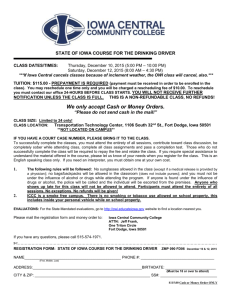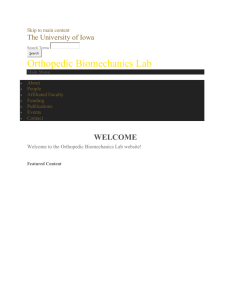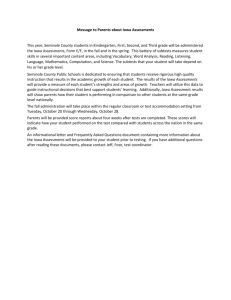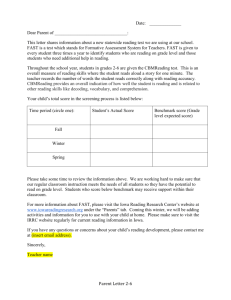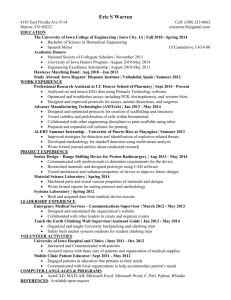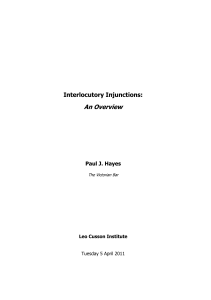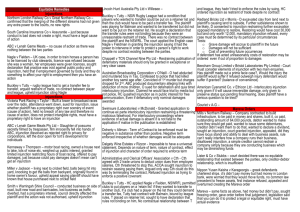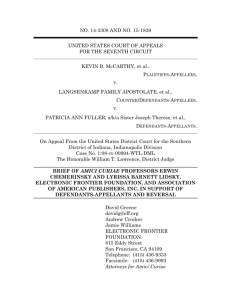Appeal for Temporary Injunction: Seafarers Union vs. Swanson
advertisement
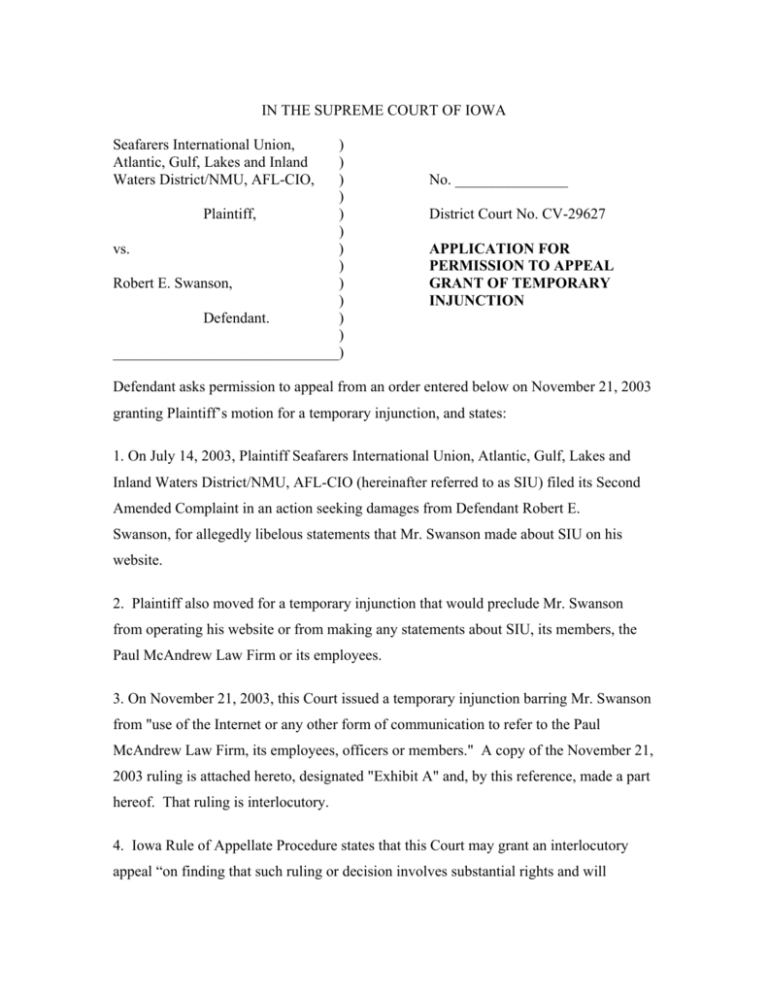
IN THE SUPREME COURT OF IOWA Seafarers International Union, Atlantic, Gulf, Lakes and Inland Waters District/NMU, AFL-CIO, ) ) ) ) Plaintiff, ) ) vs. ) ) Robert E. Swanson, ) ) Defendant. ) ) ______________________________) No. _______________ District Court No. CV-29627 APPLICATION FOR PERMISSION TO APPEAL GRANT OF TEMPORARY INJUNCTION Defendant asks permission to appeal from an order entered below on November 21, 2003 granting Plaintiff’s motion for a temporary injunction, and states: 1. On July 14, 2003, Plaintiff Seafarers International Union, Atlantic, Gulf, Lakes and Inland Waters District/NMU, AFL-CIO (hereinafter referred to as SIU) filed its Second Amended Complaint in an action seeking damages from Defendant Robert E. Swanson, for allegedly libelous statements that Mr. Swanson made about SIU on his website. 2. Plaintiff also moved for a temporary injunction that would preclude Mr. Swanson from operating his website or from making any statements about SIU, its members, the Paul McAndrew Law Firm or its employees. 3. On November 21, 2003, this Court issued a temporary injunction barring Mr. Swanson from "use of the Internet or any other form of communication to refer to the Paul McAndrew Law Firm, its employees, officers or members." A copy of the November 21, 2003 ruling is attached hereto, designated "Exhibit A" and, by this reference, made a part hereof. That ruling is interlocutory. 4. Iowa Rule of Appellate Procedure states that this Court may grant an interlocutory appeal “on finding that such ruling or decision involves substantial rights and will materially affect the final decision, and that a determination of its correctness before trial on the merits will better serve the interests of justice.” 5. This Court has previously granted interlocutory appeals for the purpose of reviewing a grant or denial of a temporary injunction. Max 100 L.C. v. Iowa Realty Co., 621 N.W.2d 178 (Iowa 2001); Wolf v. Lutheran Mut. Life Ins. Co., 236 Iowa 334 (Iowa 1947). 6. The temporary injunction infringes on Defendant’s free speech, a substantial right that can only be protected through an interlocutory appeal. 7. Both the United States and Iowa Constitutions forbid the imposition of prior restraints on speech except in the most serious circumstances. U.S. Const. Amend. I; Iowa Const. Art. I § 7; Des Moines Register & Tribune Co. v. Osmundson, 248 N.W.2d 493, 498 (1976); Organization for a Better Austin v. Keefe, 402 U.S. 415, 419 (1971). 8. Prior restraints on speech constitute irreparable injury, for which there can be no redress. Nebraska Press Ass’n v. Stuart, 427 U.S. 539, 559 (1976); Elrod v. Burns, 427 U.S. 347, 373 (1976); Iowa Right to Life Comm. v. Williams, 187 F.3d 963, 970 (8th Cir. 1999). 9. The consequences of alleged defamation can be remedied with money damages, so temporary injunctions are generally not warranted in defamation cases. Metropolitan Opera Ass’n, Inc. v. Local 100, 239 F.3d 172 (2nd Cir. 2001). 10. When temporary injunctions are issued, they must be narrowly tailored to the specific harm sought to be remedied. Carroll v. President & Comm’rs of Princess Anne, 393 U.S. 175, 183 (1968). 11. When courts issue temporary injunctions, they must make factual and legal findings. Max 100 LC, 621 N.W.2d at 183. Specific findings are also required before First Amendment rights may be infringed. See e.g. Press Enterprise v. Superior Court, 478 U.S. 1, 13-14 (1986); Rosenblatt v. Baer, 383 U.S. 75, 82 n.6 (1966); see also U.S. v. Noriega, 917 F.2d 1543, 1549 (11th Cir. 1990). 2 12. There is a significant societal interest in a robust public discourse. Brammer v. KB Home Lone Star, L.P., 114 S.W.3d 101 (Tex. 2003). This interest can only be protected by an interlocutory appeal. 13. The Paul McAndrew Law Firm, the beneficiary of the temporary injunction, is not a party to this case. Preventing the firm’s participation as a party in this case will serve the interests of justice. 14. Under Iowa Rule of Civil Procedure 1.201, “[e]very action must be prosecuted in the name of the real party in interest.” 15. The district court failed to apply the appropriate law when it evaluated the merits of the underlying controversy, so interlocutory review will materially affect the decision and promote judicial efficiency. 16. In defamation cases arising from labor disputes, the court must apply the New York Times actual malice standard. Linn v. United Plant Guard Workers of America, 383 U.S. 53 (1966); Old Dominion Branch No. 496, Nat. Ass'n of Letter Carriers, AFL-CIO v. Austin, 418 U.S. 264, 281 (1974); Batson v. Shiflett, 602 A.2d 1191, 1208 (Md. 1992); Henderson v. Teamsters Local 313, 90 Wash.2d 666, 670 (1978). 17. No liability for defamation can be imposed based on statements that cannot be proven true or false. Milkovich v. Lorain Journal Co., 497 U.S. 1, 20 (1990). 18. Defendant will file a brief contemporaneously with this application. 3 WHEREFORE, Defendant Robert E. Swanson requests that the Court grant this application. Respectfully Submitted, ____________________________ Catherine K. Levine 3110 SW 29th Street Des Moines, Iowa 50321 Voice: 515-244-4813 Fax: 515-244-4813 *51 catlevine@mchsi.com ____________________________ Charlotte J. Garden Paul Alan Levy Public Citizen Litigation Group 1600 – 20th Street, N.W. Washington, D.C. 20009 202-588-1000 Attorneys for Petitioner 4

